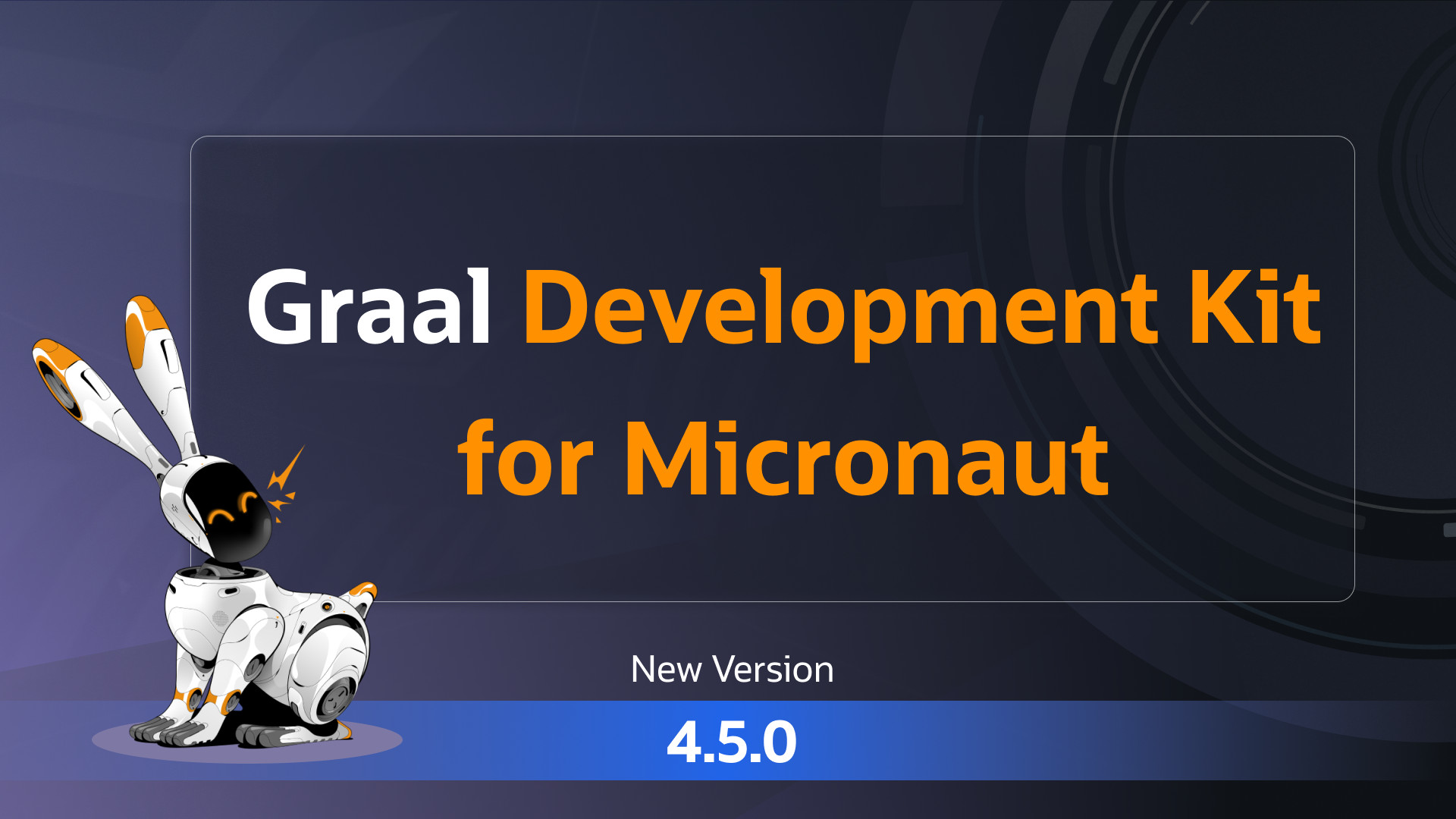
Today, we are announcing the general availability of Graal Development Kit for Micronaut 4.5.0 based on Micronaut® framework 4.5.0. Let us look at some of the notable changes in this release.
Graal Development Kit for Micronaut (GDK), previously Graal Cloud Native (GCN), is an Oracle build of the open source Micronaut® framework. The GDK provides a curated set of Micronaut framework modules that simplify cloud application development, are designed to compile ahead of time with GraalVM Native Image, and are fully supported by Oracle. GDK modules provide platform-independent APIs and libraries for several core public cloud services across Oracle Cloud Infrastructure (OCI), Amazon Web Services (AWS), and Google Cloud Platform (GCP), with Microsoft Azure coming soon.
The GDK enables you to easily build portable cloud native Java microservices that start instantly and use fewer resources to reduce your compute costs. You can write Java applications once and run them on any supported public cloud—OCI, AWS, and GCP—and avoid cloud vendor lock-in.
Renaming Completed
In the previous release, we announced our plan to rename the project to GDK. We are happy to share that the renaming is now complete. All artifacts, including the bill of materials, launcher, CLI, IDE extensions, modules, guides and code samples, have been renamed from GCN to GDK.
Bill of Materials with Micronaut Framework 4.5.0
In this release, we have updated the Micronaut framework version from 4.3.7 to 4.5.0, applying patches and improvements to several Micronaut modules. See Micronaut Framework Releases for more information. The GDK 4.5.0 bill of materials contains specific versions of Micronaut framework 4.5.0 modules and their dependencies that are compatible and tested together. This reduces the risk of library incompatibility and version mismatches, and saves you from having to test and figure this out for yourself.
The GDK 4.5.0 bill of materials uses “gdk” instead of “gcn”. Shown below are snippets from the build files for GDK 4.5.0 vs GDK 4.3.7:
GDK 4.5.0 – Gradle:
dependencies {
micronautBoms(platform("cloud.graal.gdk:gdk-bom:4.5.0.0"))
...
}
GDK 4.3.7 – Gradle:
dependencies {
micronautBoms(platform("cloud.graal.gcn:gcn-bom:4.3.7.2"))
...
}
GDK 4.5.0 – Maven:
<dependency> <groupId>cloud.graal.gdk</groupId> <artifactId>gdk-bom</artifactId> <version>4.5.0.0</version> <type>pom</type> <scope>import</scope> </dependency>
GDK 4.3.7 – Maven:
<dependency> <groupId>cloud.graal.gcn</groupId> <artifactId>gcn-bom</artifactId> <version>4.3.7.2</version> <type>pom</type> <scope>import</scope> </dependency>
GDK 4.5.0 works with both Java 21 and Java 17. GDK modules offer out-of-the-box support for native compilation with Oracle GraalVM for JDK 21 and JDK 17 Native Image. GDK applications compiled ahead of time with GraalVM Native Image require far less memory and CPU to run at scale, start up to 100x faster, operate at peak performance immediately, and have a much smaller attack surface compared to their traditional JVM-based counterparts.
New Serverless Guide
This release contains a new guide for Serverless OCI Functions. This guides uses OCI Resource Manager and Terraform to automate the provisioning of cloud resources. This will eliminate any manual error-prone steps and save you precious time while trying out the guide.
GDK Tools
The latest release of the GDK tools brings with it some great updates. Most notably a rename of the extensions that provide support for the Micronaut framework, and the first release of the OCI Config Policy tool, that makes working with Oracle Cloud easier. Take a look at the GDK Tools release 4.5.0 blog post to find out more.
Next Steps
- If you are running GDK 4.3.7 or earlier versions, you should start using GDK 4.5.0.
- If you are new to the GDK, try one of our Hands-on Labs or Guides or use the Get Started guide.
- Visit https://graal.cloud/gdk to learn more about the GDK.
- Join the Oracle Developers workspace in Slack and then join the #graal-dev-kit-for-micronaut channel to provide feedback about the GDK.
Micronaut® is a registered trademark of Object Computing, Inc. Use is for referential purposes and does not imply any endorsement or affiliation with any third-party product.
